Graham Reid | | 6 min read
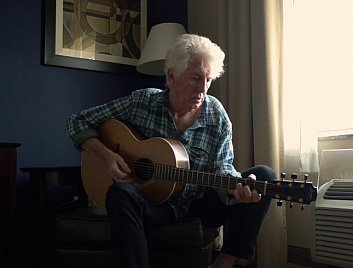
“Over many years,” he said, “I watched John and Yoko ‘fight the good fight’ for many whose voices were not being heard, a fight that Yoko continues to this day.
“I’m proud to be associated with the many fine artists who were previously honoured with the John Lennon Real Love Award.”
Nash won a Grammy in 1970 as part of Crosby Stills and Nash when they were voted best new artist and he's twice been inducted into the Rock and Roll Hall of Fame, as a member of CSN in 1997 and as a member of The Hollies in 2010.
It's been quite a career which has seen him as a solo artist, part of the expanded CSN with Neil Young, and recording with Crosby.
Nash's new album Now – a title emphasising his existence as a contemporary artist as much as an update on where he's at – there's I Watched It All Come Down, “to the rock'n'roll parade just out of town, making music playing it loud”.
And he did.
Nash, a longtime Angeleno with little trace of an American accent, was in that wave of British Invasion bands in the wake of the Beatles when the Hollies – which he co-founded in Manchester with schoolmate and lifelong friend Allan Clarke – swept up the global charts with Just One Look, Here I Go Again, I'm Alive, Bus Stop and a string of top five hits elevated by the band's three-part harmonies.
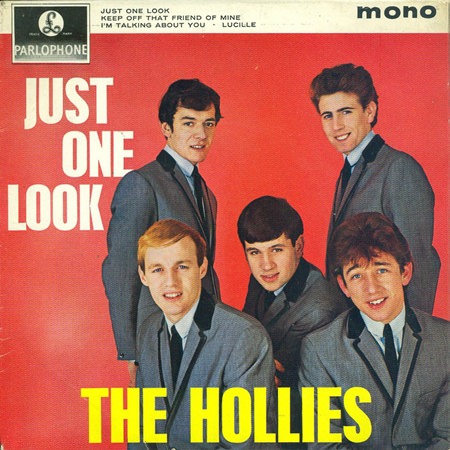 But when his later songs were rejected for being too complex for their pop audience – his lightlydelic King Midas in Reverse in 1967 just scraping into the British top 20 – he chaffed.
But when his later songs were rejected for being too complex for their pop audience – his lightlydelic King Midas in Reverse in 1967 just scraping into the British top 20 – he chaffed.
His escape came unexpectedly in Laurel Canyon in the hills above Los Angeles – at the home of either Cass Elliot of The Mamas and the Papas or Joni Mitchell's, the story changes -- when he sang with David Crosby and Stephen Stills.
Something in their magical harmonies connected and the second performance of Crosby, Stills & Nash – which sounded like an accountancy firm but allowed them individual space – was at Woodstock (with Neil Young).
But seeds of internal dissent were there from the start.
“We had to put Crosby’s name first otherwise he’d be impossible to live with,” Stills told me in 2007. “And of course once we put him first there was no living with him.
“We didn't like each other like all good bands are supposed to, but as it turned it out it was much harder to pull away.
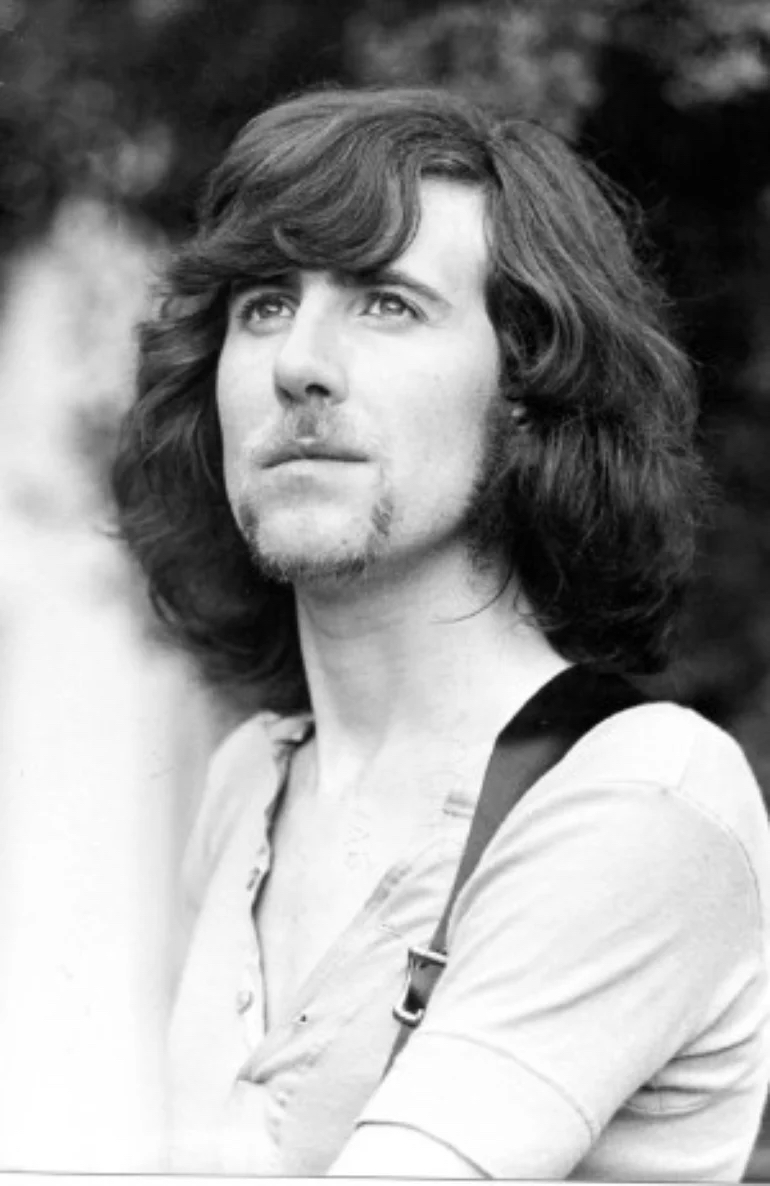 “David and I were pinching ourselves at the good fortune that Nash had showed up . . . we didn’t want to be married to a band because basically you either killed each other off or just became so dissolute and self-destructive that you couldn’t work.
“David and I were pinching ourselves at the good fortune that Nash had showed up . . . we didn’t want to be married to a band because basically you either killed each other off or just became so dissolute and self-destructive that you couldn’t work.
“But of course we did all that anyway.”
That same year Crosby told me “that [musical tension] was a good thing and that’s worth it to me to put up with [Stills].
“I’m very good friends with Nash and love him dearly. I care about Stephen too but he and I disagree about a whole lot of things. It doesn’t mean I don’t respect him and certainly doesn’t mean we can’t make music together.
“He may not be as straight with you about it as I am, but he doesn’t deny it.”
Had only Crosby and Nash got together they would have sounded like a slightly stoned Simon and Garfunkel, but with Stills’ passion for edgy rock’n’roll there was flintiness which fuelled their creativity.
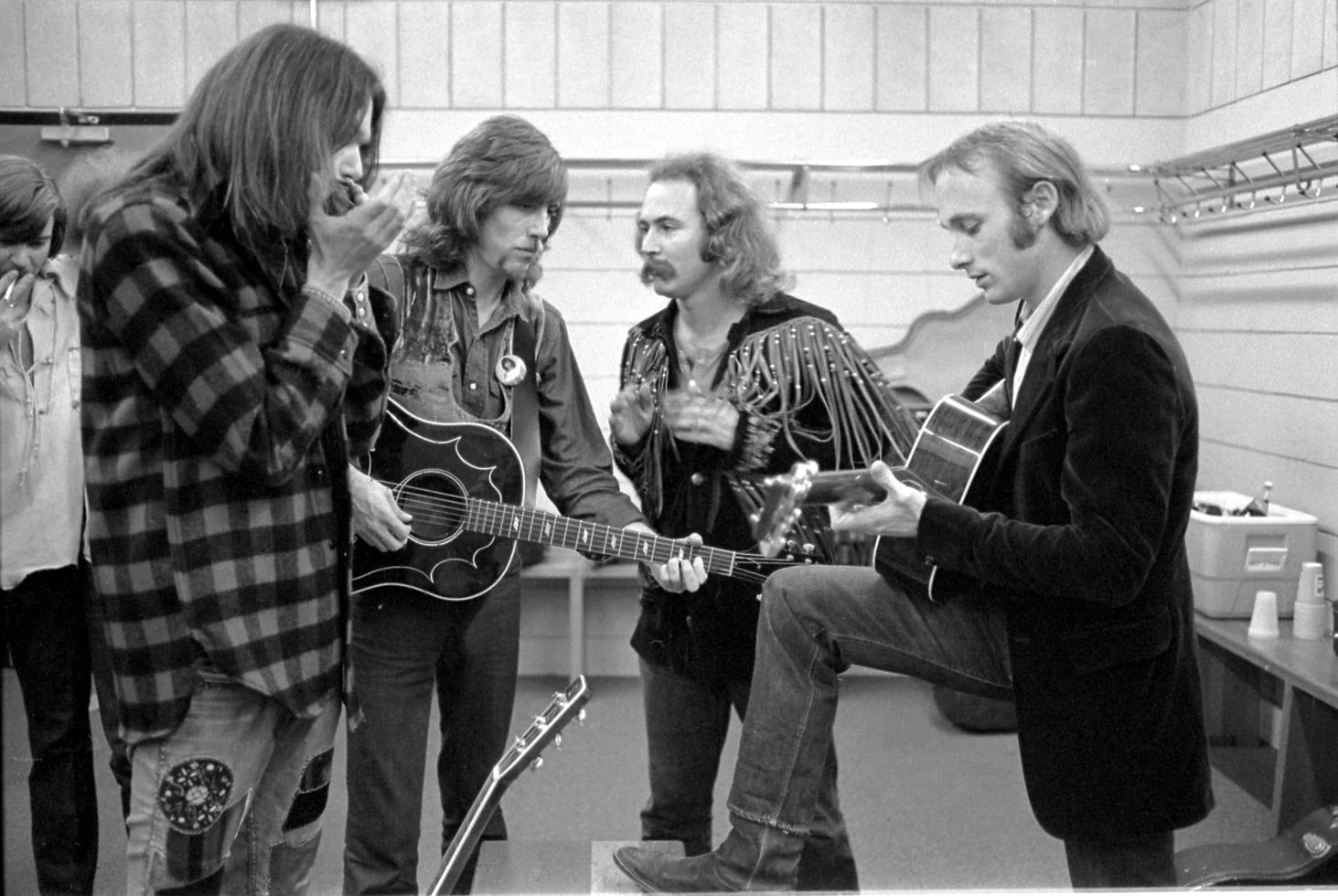 Up until Crosby's death death in January at 81 – after a lifetime of drugs, health issues, obesity and shooting his mouth off – there was tension between him and Stills.
Up until Crosby's death death in January at 81 – after a lifetime of drugs, health issues, obesity and shooting his mouth off – there was tension between him and Stills.
Nash was caught in the crossfire too.
To borrow an image from This is Spinal Tap, Nash sometimes seemed like the lukewarm water between the fire and ice of Crosby and Stills.
Crosby's death was hardly a surprise, “he didn't take good care of himself”, says Nash with polite understatement, but they were in touch and he set up a chat time with him.
“But the call never came and two days later David was dead.
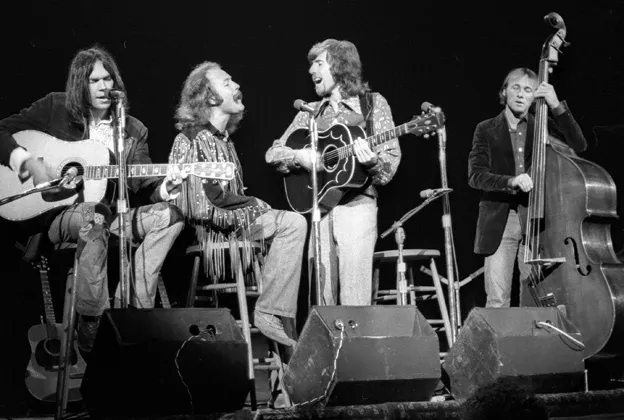 “He was my best friend, my partner for many years and I will miss in terribly. “What we were arguing about in those final years is completely meaningless and we were trying to get together and sort it out before he passed.”
“He was my best friend, my partner for many years and I will miss in terribly. “What we were arguing about in those final years is completely meaningless and we were trying to get together and sort it out before he passed.”
He has a favourite photograph of the two of them together singing around a microphone in CSN days.
“It reminds me how I'm going to miss David. I choose to remember only the good music and the good times. And now he's gone.”
A happier image is of his old partner Joni Mitchell singing at the Newport Folk Festival last year after more than a decade away and a brain aneurism in 2015.
“I saw Joni when she was awarded the Gershwin Prize [in January] and asked if she had any new paintings or songs and she said, 'No . . . not yet'.
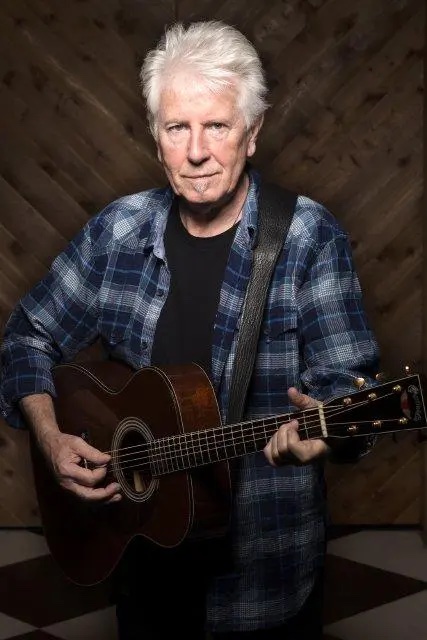 “When she said that I knew she was in there and her brain was thinking. The truth is we almost lost her and it was wonderful to see her coming back.”
“When she said that I knew she was in there and her brain was thinking. The truth is we almost lost her and it was wonderful to see her coming back.”
Nash himself is happy, the first line on the new album Now is “I used to think I would never love again, I'd be all on my own” and is a tribute his wife Amy Grantham whom he met in 2016 and married three years later.
There has always been a direct uncoded quality to Nash's lyrics – “our house is a very, very fine house” – and he admits “I've always wanted to the reach the heart as quickly as possible, I'm not a writer who has to write 15 verses before you know what I'm talking about. I want to engage you immediately.”
On the album there is also Buddy's Back – about Buddy Holly and the early days of the Hollies who took their name from him – which offers a further clue to his unadorned lyrical style.
“The Hollies loved Buddy Holly, he was a very simple and direct writer, and basically one of us. He wore a tie, a suit and glasses, he wasn't like Elvis.
We absolutely loved him and me and Allan [Clarke] used to stand in front of a mirror and pretend to be the Everly Brothers or Buddy.
“We loved how they sounded and tried to sound like that. Then we forgot all about that and brought out our music like we wanted it to sound.
“I wrote Buddy's Back for Allan's Clarke's new solo album, and of course for mine.”
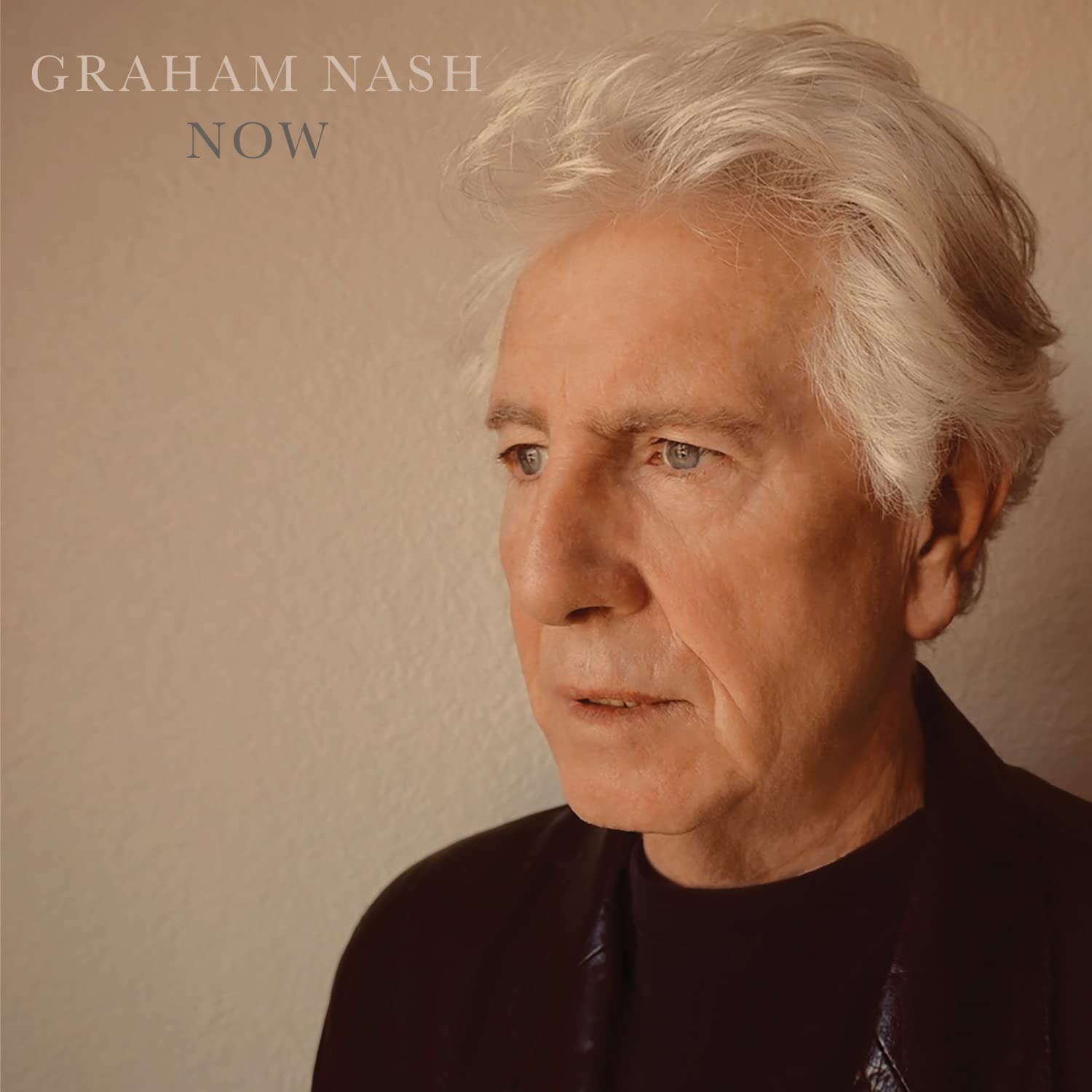 A constant thread in his work has also been responding to political issues. Military Madness on his first solo album Songs For Beginners in 1971 was about his father taken off to the Second World War and young men to Vietnam; Chicago from the same album about anti-war protests in 1968 and the trial of the “Chicago Eight” to Soldiers of Peace on the 1988 CSN and Young reunion album American Dream.
A constant thread in his work has also been responding to political issues. Military Madness on his first solo album Songs For Beginners in 1971 was about his father taken off to the Second World War and young men to Vietnam; Chicago from the same album about anti-war protests in 1968 and the trial of the “Chicago Eight” to Soldiers of Peace on the 1988 CSN and Young reunion album American Dream.
And don't get him started on Donald Trump and the Republicans whom he deals to in Golden Idol on Now.
He sees democracy in the United States and Europe under threat and fragile, and that Trump and his followers – “Ron DeSantis, Ted Cruz, all these people following Trump” – are going to be around for a long time”.
“We thought Richard Nixon was bad,” he laughs bitterly, “but this is much worse. I don't believe Nixon wanted to end democracy but he sure did utilise his power in a very bad way.”
It's an issue he circles back to in our conversation, but also concludes “we have to be optimistic because the opposite is awful and chaotic, we have to feel tomorrow will be better than today”.
So the measured, respected photographer, two-time Hall of Famer and rather earnest Graham Nash from Salford – who saw pop frenzy with the Hollies, stood on the stage at Woodstock, endured the cynical Nixon era, witnessed too many wars, wrote his autobiography Wild Tales and now rails against Trump and his Republicans – really did watch it all come down?
“Yeah, it's been amazing life, hasn't it?”, he says, as if surprised by it himself.
Graham Nash and his band play the Civic Theatre, Auckland March 1 and the Isaac Theatre, Christchurch March 3


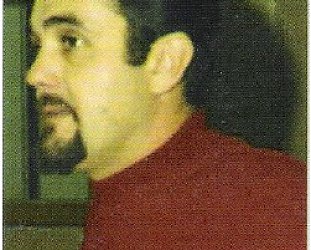
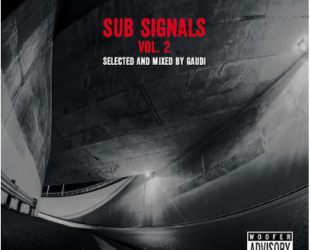

post a comment